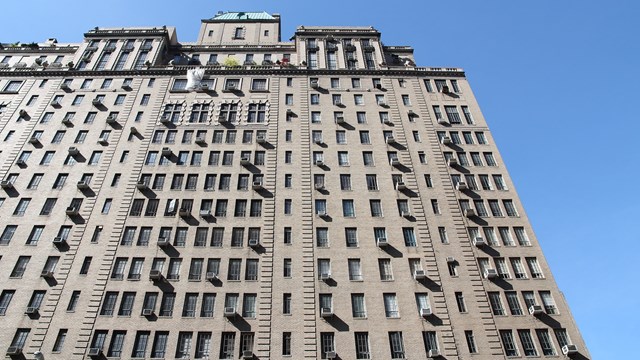Property owners will now be responsible for the maintenance and repair of public sidewalks in front of their buildings following passage of legislation that transfers liability from the city to the owners of multi-family dwellings.
Mayor Michael R. Bloomberg recently signed a pair of bills that were part of a tort reform package aimed at reducing the city's liability to pay for accident claims resulting from defective or improperly maintained sidewalks.
Intro 193, also called the Adjoining Landowner Liability Bill, will hold building owners liable if they fail to comply with their existing duty to repair and maintain the sidewalks in front of their buildings, and also to shovel snow and remove it from the premises in winter. One-, two- and three family dwellings are exempt.
"New York City has 12,750 miles of sidewalks. Laid end-to-end they would stretch halfway around the world. It would cost the city billions of dollars to hire sidewalk repair crews to repair all sidewalk defects and keep the sidewalks perfectly free of defects," says Mayor Bloomberg.
Under current law, says Mayor Bloomberg, property owners had been required to keep sidewalks in good repair and free of snow or ice. However, if they failed to comply with this statutory duty and someone was injured, oftentimes only the city would get sued, he says.
"In the past three years, the city has paid out over $189 million in judgments as a result of actions brought for damages caused by sidewalk defects and falls on snow and ice," continues Mayor Bloomberg. "Such suits are the most common type of litigation brought against the city. For over 20 years, the city has been trying to change this law, today we are finally successful. This legislation will save the city up to $40 million a year and help us weather our fiscal crisis. This bill will not only save the city millions of dollars but will also encourage property owners to keep the sidewalks in good repair, which will mean safer sidewalks and fewer injuries," says the mayor.
Although buildings are certain to have insurance, the bill's passage is a blow to property owners and homeowners, who are already paying higher insurance, real estate taxes and maintenance fees during the city's fiscal crisis, according to Al Pennisi, a senior partner with Pennisi, Daniels and Norelli, and the president of the Federation of New York Housing Cooperatives and Condominiums (FNYHC).
"It creates a heavy burden on the cooperatives and the condominiums. Until they changed the law, they also had the city responsible. And now the city is abdicating their responsibility and now saying "˜you, the property owner are totally responsible.' And you're dealing with a public sidewalk, which you do not as an owner have total control over," says Pennisi. "At least until they changed the law, the city had some responsibility. Now they have none." The city installs a sidewalk and may cause damage to it but bear no responsibility for its upkeep and repair. Leaving that responsibility and liability to the property owner "is really not fair," says Pennisi.
Insurance companies haven't yet reacted to the legislation's passage, says Alex Seaman of Kaye Insurance in Long Island, but the bill is likely to have an effect. "It definitely increases the exposure to property owners for slip-and-fall claims. Most insurance carriers have not responded formally to the legislation but it could certainly result in significant rate increases on premises liability," Seaman says.
Policies do typically cover a property and adjacent premises. All standard policies contain what is called a "designated premises endorsement" clause, which extends to "operations necessary or incidental to the premises, which is generally accepted as walkways immediately adjoining" a piece of property, according to Seaman.
"What will happen also," Seaman explains, "is that it could result in far greater loss control requirements by the insurance carriers." Carriers could require more thorough inspections of the sidewalks as a result and mandatory instructions to improve or replace all uneven sidewalk areas, which could be an enormously expensive proposition.
Carriers could require a formal engineering inspection or survey be done of any sidewalk they believe to be unsafe as well and this could be a more frequent occurrence.
"Minor repairs are not normally terribly expensive - patchwork - but to replace a large section of sidewalk can be huge. And with respect to property owners they'll have to be far more diligent in maintenance, including snow removal, clearing debris, garbage cans," Seaman says.
In Seaman's 20 years of experience, in most slip-and-fall cases, claims are more often made against a property owner and not the city. "It's a lot tougher to sue the city than it is a private property owner. Based on my experience, I've seen it far more common to sue the property owner."
Buildings are already or should be insured to cover such liability, says Greg Carlson, executive director of the Federation of New York Housing Cooperatives and Condominiums. "If you take most cooperatives or condominiums, it really doesn't affect them because they have adequate insurance. And when someone falls, they sue everybody," Carlson says. The city is limiting its own exposure and transferring that exposure to the property owner.
Carlson also is worried that the bill will result in higher premiums. "The bill will probably be something that insurers will use to increase premiums because they have greater exposure - a higher risk." He has heard through the grapevine from brokers that costs could potentially rise as much as 15 percent. "That's another cost affecting buildings that are already tapped out."
A second bill signed by Mayor Bloomberg addresses the existence of property insurance and who would be responsible for compensation should a person become injured on a defective or unmaintained sidewalk. Intro 522 is a local law that would require owners of real property to maintain liability insurance for personal injury and property damage claims caused by the failure of an owner to maintain the sidewalk abutting their property and keep it in a reasonably safe condition.
The bill states that if a judgment of personal injury including death is obtained against an abutting property owner and that owner fails to have general liability insurance or is insufficiently covered to satisfy the court's judgment, the city's comptroller upon consultation with the city's corporation counsel, is empowered to pay for that personal injury and the cost of uncompensated medical expenses. No payment shall exceed $50,000 and the total of all such payments for any judgments in a given fiscal year is not to exceed $4 million dollars, according to the legislation.
"Part of what makes the city such an inviting target for tort lawyers," says Mayor Bloomberg, "is the fact that the city has "˜deep pockets' - it has the ability to satisfy judgments obtained against it. Much of the opposition to tort reform can be attributed to a concern that others may not have such deep pockets. The city should not be liable for another person's negligence," he says.
This second bill, however, attempts to provide compensation whenever a property owner isn't adequately covered or has no other assets, in which to satisfy or pay an injury claim, Mayor Bloomberg says.
These bills, according to the mayor, "strike a reasonable balance between the principle that the city should not be liable for the wrongs of another and the principle that persons injured by the wrongs of another should receive compensation."
Both bills have taken effect and apply only to accident claims occurring after the signing date.







5 Comments
Leave a Comment